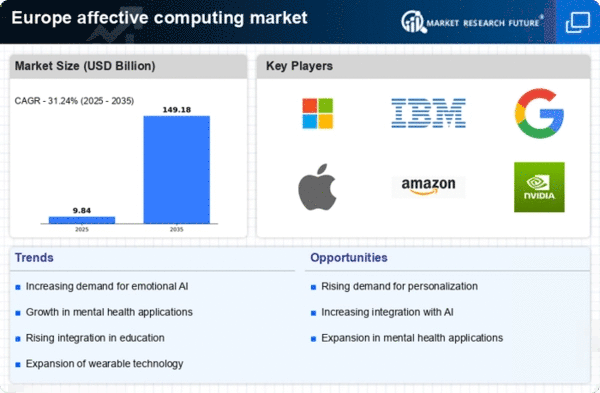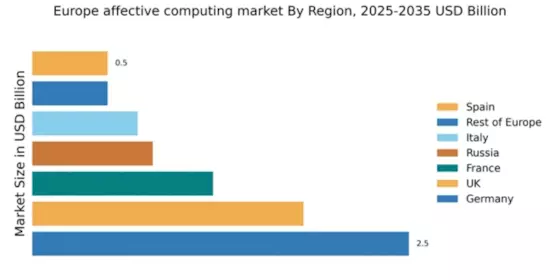Technological Advancements in AI
The rapid evolution of artificial intelligence (AI) technologies is a primary driver for the affective computing market in Europe. Innovations in machine learning and natural language processing enable systems to better understand and interpret human emotions. This capability is increasingly being integrated into various applications, including customer service and mental health support. The European market for AI is projected to reach €100 billion by 2025, indicating a robust growth trajectory. As businesses recognize the value of emotional intelligence in enhancing user experience, the demand for affective computing solutions is likely to surge. Furthermore, the integration of AI with affective computing can lead to more personalized interactions, thereby improving customer satisfaction and loyalty. This trend suggests that the affective computing market will continue to thrive as technological advancements unfold.
Rising Interest in Human-Robot Interaction
The increasing interest in human-robot interaction (HRI) is emerging as a significant driver for the affective computing market in Europe. As robots become more integrated into daily life, their ability to understand and respond to human emotions is crucial for effective interaction. This trend is particularly evident in sectors such as healthcare, where robots are being used for therapy and companionship. Research suggests that robots equipped with affective computing capabilities can improve patient outcomes by providing emotional support. The market for HRI technologies is projected to grow at a CAGR of 25% over the next five years, indicating a robust demand for affective computing solutions. As the industry evolves, the potential for innovative applications in various fields suggests a promising future for the affective computing market.
Integration of Affective Computing in Education
The education sector in Europe is increasingly recognizing the potential of affective computing technologies to enhance learning outcomes. By integrating emotional recognition systems into educational tools, institutions can better understand student engagement and emotional well-being. This integration is particularly relevant in remote learning environments, where emotional cues may be less visible. Research indicates that students who receive emotional support through technology demonstrate improved academic performance. The affective computing market is likely to benefit from this trend as educational institutions invest in tools that foster emotional intelligence and adaptive learning. As the demand for innovative educational solutions grows, the market for affective computing applications in education is expected to expand significantly, potentially reaching €5 billion by 2027.
Growing Demand for Personalized User Experiences
In the current landscape, there is a marked shift towards personalized user experiences across various sectors, which significantly impacts the affective computing market in Europe. Consumers increasingly expect tailored interactions that resonate with their emotional states. This demand is particularly evident in sectors such as retail and entertainment, where companies are leveraging affective computing technologies to analyze customer emotions and preferences. According to recent studies, 70% of consumers are more likely to engage with brands that offer personalized experiences. As businesses strive to meet these expectations, the affective computing market is poised for substantial growth. The ability to analyze and respond to emotional cues not only enhances customer engagement but also drives brand loyalty, suggesting a promising future for affective computing solutions in Europe.
Regulatory Support for Mental Health Technologies
The increasing focus on mental health awareness in Europe has led to supportive regulatory frameworks that encourage the development of affective computing technologies. Governments are recognizing the importance of mental health and are promoting initiatives that integrate technology into mental health care. This regulatory support is likely to drive investment in the affective computing market, as companies seek to develop solutions that align with these initiatives. For instance, the European Commission has allocated €1 billion to mental health projects, which may include funding for affective computing applications. As mental health becomes a priority, the demand for technologies that can assess and respond to emotional states is expected to rise, indicating a favorable environment for the growth of the affective computing market.

















